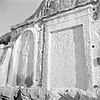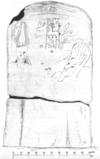Egyptian stelae in the Levant
Appearance
(Redirected from Egyptian Stelae in the Levant)
The Egyptian Stelae in the Levant are the approximately 25 Ancient Egyptian stelae discovered in the Levant, today known as Syria, Lebanon, Israel, Palestine and Jordan.[1] The most notable examples are the Stelae of Nahr el-Kalb and the Beisan steles.
Only five pharaohs are represented: Thutmosis III and his son Amenophis II (1479 - 1401 BC, both 18th dynasty), Seti I and his son Ramesses II and (1290 BC to 1213 BC, both 19th dynasty), and Shoshenq I (943–922 BC, 22nd dynasty).
List of known stelae
| Original location | Image | Pharaoh / year | Preservation | Discovery date | Current location | Ref. |
|---|---|---|---|---|---|---|
| Stelae of Nahr el-Kalb |  |
Ramesses II, year 4 | rock-stela, eroded | 1697 | in situ | [2] |
 |
Ramesses II, year 10 | rock-stela, eroded | 1697 | |||

|
Ramesses II | rock-stela, eroded, vandalized in 1860/61 | 1697 | |||
| Aadloun stele |  |
Ramesses II | rock-stela, eroded since destroyed | ? | in situ, now destroyed | |
| Al-Shaykh Saad |  |
Ramesses II | complete, eroded | 1891 | (unknown) | [3] |
| Tell Shihab |  |
Seti I | Fragment | 1901 | Istanbul | [4] |
| Byblos | 
|
Ramesses II, year 4 | Two fragments | 1919 | Beirut | |
| Tell al-Nabi Mando |  |
Seti I | Fragment | 1921 | Aleppo | |
| Beisan steles |  |
Seti I | Fragment | 1921 | Rockefeller Archeological Museum | |
 |
Seti I, year 1 | Complete | 1923 | |||
 |
Ramesses II, year 18 | Complete | 1923 | Penn Museum | ||
| Ramesses II | Two fragments | 1923, 1925 | Jerusalem and Penn Museum | [5] | ||
| Tel Megiddo |  |
Sheshonq I | Fragment | 1925-29 | Jerusalem | [6][7] |
| Tell el-'Oreimeh | Thutmosis III or Amenophis II | Fragment | 1928 | Deganya | [8] | |
| Byblos | Thutmosis III (?) | Fragment | 1933-38 | Beirut | ||
| Tyre | Seti I | Two fragments | 1960s | |||
| Ramesses II | Fragment | 1960s | ||||
 |
Ramesses II | Fragment | prior to 1975 | |||
| Al-Kiswah | Ramesses II, year 56 | Fragment | 1994 | Damascus | ||
| at-Turra | Ramesses II | Fragment | 1999 | in situ | ||
| Maydaa | 
|
2010 | [9] |
See also
Bibliography
- Wimmer, Stefan Jakob [in German] (2002). "A New Stela of Ramesses II in Jordan in the Context of Egyptian Royal Stelae in the Levant". Universitätsbibliothek der Ludwig-Maximilians-Universität München. doi:10.5282/UBM/EPUB.14236. Retrieved 2023-04-17.
- Weinstein, James M. (1981). "The Egyptian Empire in Palestine: A Reassessment". Bulletin of the American Schools of Oriental Research (241). American Schools of Oriental Research: 1–28. doi:10.2307/1356708. eISSN 2161-8062. ISSN 0003-097X. JSTOR 1356708. S2CID 164015977. Retrieved 2023-04-23.
References
- ^ Wimmer, Stefan Jakob [in German] (2002). "A New Stela of Ramesses II in Jordan in the Context of Egyptian Royal Stelae in the Levant". Universitätsbibliothek der Ludwig-Maximilians-Universität München. doi:10.5282/UBM/EPUB.14236. Retrieved 2023-04-17.
- ^ Weißbach, Franz Heinrich [in German] (1922), Theodor Wiegand (ed.), "Die Denkmäler und Inschriften an der Mündung des Nahr el-Kelb", Wissenschaftliche Veröffentlichungen des deutsch-türkischen Denkmalschutz-Kommandos (6), de Gruyter
- ^ Schumacher, G. (1891). "Der Hiobstein, Sachrat Eijub, im Hauran". Zeitschrift des Deutschen Palästina-Vereins. 14. Deutscher verein zur Erforschung Palästinas: 142–147. ISSN 2192-3124. JSTOR 27928608. Retrieved 2023-04-18.
- ^ Smith, 1901, p. 347 ff
- ^ https://www.penn.museum/collections/object/198551
- ^ Chapman III, Rupert L. (2009). "Putting Sheshonq I in his Place". Palestine Exploration Quarterly. 141 (1). Informa UK Limited: 4–17. doi:10.1179/174313009x387617. ISSN 0031-0328. S2CID 218661383.
- ^ "OIC 4. The Excavation of Armageddon". Institute for the Study of Ancient Cultures. Retrieved 2023-04-21.
- ^ Albright, W. F.; Rowe, Alan (1928). "A Royal Stele of the New Empire from Galilee". The Journal of Egyptian Archaeology. 14 (3/4). Egypt Exploration Society: 281–287. doi:10.1177/030751332801400157. ISSN 0307-5133. JSTOR 3854305. S2CID 194005637. Retrieved 2023-04-18.
- ^ Lagarce, Bérénice (2010). "UNE STÈLE RAMESSIDE À MEYDAA (RÉGION DE DAMAS) ET LA PRÉSENCE ÉGYPTIENNE EN UPÉ". Syria. 87 (87). Institut Francais du Proche-Orient: 53–68. doi:10.4000/syria.652. ISSN 0039-7946. JSTOR 41681330. S2CID 193681904. Retrieved 2023-04-17.<
